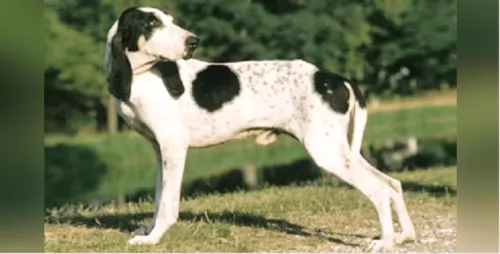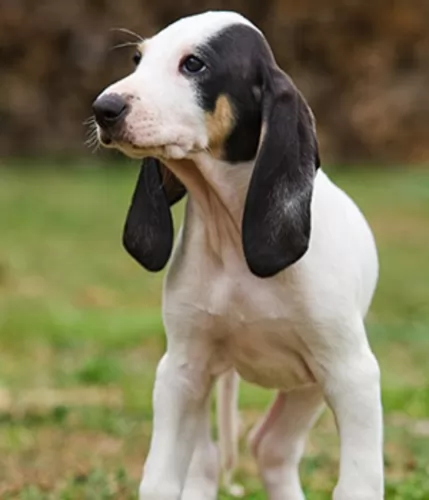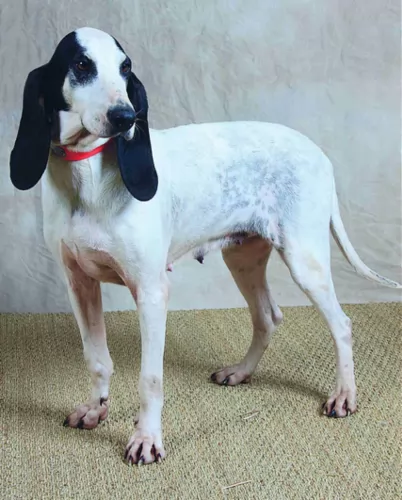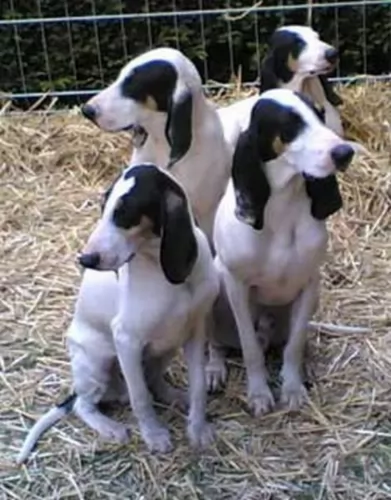 Petzlover
PetzloverAriegeois is originated from France but Bisben is originated from India. Ariegeois may grow 18 cm / 7 inches shorter than Bisben. Ariegeois may weigh 28 kg / 61 pounds lesser than Bisben. Both Ariegeois and Bisben has almost same life span. Ariegeois may have less litter size than Bisben. Both Ariegeois and Bisben requires Low Maintenance.
 The Ariegeois is a fairly new breed, believed to have originated in France in 1912. As a scent hound, it is a blend of 3 French scent hounds - Grand Gascon-Saintongeois, Grand bleu de Gascon and the Briquet.
The Ariegeois is a fairly new breed, believed to have originated in France in 1912. As a scent hound, it is a blend of 3 French scent hounds - Grand Gascon-Saintongeois, Grand bleu de Gascon and the Briquet.
Just to show you how ancient these breeds are, the Grand bleu were thought to have been brought to France by an ancient civilization, the Phoenicians, who traded wares and dogs. The Briquet is native to southern France but they have been used as hunting dogs as far back as pre-Roman times.
As the breeds mixed, the Ariegeois came about. A popular pack dog emerged with an excellent sense of smell that would stand the dog in good stead for hunting. Today, while still fairly uncommon beyond French borders, the dog is highly regarded for its extraordinary hunting abilities and his loyal, affectionate nature towards his human companions.
There is a lot of mystery surrounding this large herding dog said to come out of the Himalaya Mountains of Asia. The belief is that sheepdogs were crossed with wolves toward the end of the 18th century, but his origin is basically unknown. They are both herding dogs and guard dogs. Others theorize that rather than a wolf, the breed arose from the Mastif family. Still others claim that the Bisben is not a breed at all but rather a “landrace”. A landrace is an animal group that is only found to exist in the local area or is bred locally for a specific reason, while a breed is developed intentionally and from a select purebred with pedigree. The Bisben may be a landrace since it is very popular in India but hardly known anywhere else. What is known is that the Brisben was in existence at the end of the 1700’s and its job was to protect and herd livestock. There are three main theories about the origin of the Bisben. They are, in no particular order:
1. The Bisben was developed by mixing several different Himalayan and Indian Sheepdogs with wolves. The wolf population in the Himalayas and in India live in very close proximity to dogs and people and this population is quite large. These Tibetan and Indian wolves are known to be smaller, more comfortable with people and less aggressive than wolves from other parts of the world.
2. The Bisben was developed by mixing local sheep herding dogs with the Tibetan Mastiff. This gave the breed its protective nature and its large size according to this theory.
3. The Bisben was developed by mixing local dogs with the ones the British, Portuguese and French imported to the India subcontinent.
There is a fourth theory as well and it combines all three of these, supposing that the Bisben is a product of crossing local dogs with wolves, Tibetan Mastiffs and European dogs.
Regardless of their origins, the Bisben grew into one of the most respected animals in the Southern Himalayas. Their assistance to the shepherds of the area was unquestioned and irreplaceable. They were touch enough to herd flocks of goats or sheep across several treacherous and unstable mountain passes. The environment in which these dogs worked when herding is one of the harshest environments on the face of the earth. Temperatures were dangerously cold, altitudes dangerously high and the terrain just plain dangerous. Many deadly large predators live there as well. This included tigers, Asiatic black bears, golden eagles, Himalayan brown bears, snow leopards, fox, dholes, wolves, and small cats. The Bisben had to be able to fight off all of these predators. In addition to these herding and protecting duties, the Bisben was also known throughout the region as an excellent hunting dog. They are capable to this day of hunting large prey such as antelope or deer. They are equally comfortable hunting alone or in a pack. He has grown into one of the most popular hunting dogs in all of India.
The Himalayas, being so rugged and treacherous, were inaccessible to most of India for many centuries and the Brisben was unknown as well. Through the British imperialist expansion across all of the Indian subcontinent, the lowlands people were connected to the highlands and mountain people for the first time. This also meant that the Brisben was no longer unknown. The entire country began to appreciate the dog for its protection and herding of livestock, as well as a companion animal who would protect its owner and family as well. As India continues to grow the popularity of the Brisben grows as well and its numbers increase regularly. The breed, if it is a breed, remains an Indian secret. They have migrated to the countries around India, but their number are small. It is only in India that they are revered and prosper. They are not present in any great numbers in Europe, North America, Japan, or most of Asia.
Whether or not the Bisben becomes a recognized breed depends upon those who own and fancy them. Most Bisbens are bred to only other Bisbens in an effort to purify the breed. However, few dogs have pedigrees and the practice of breeding the Brisben to other breeds and mixed breed to acquire specific characteristics continues to this day. It is unlikely that the Bisben will ever be a purebred dog. It is quite variable in how it looks depending upon what the breeding line of the individual dog actually is. Does it look like a wolf? Does it look like a larger version of a local or European dog? There will always be these questions around the Bisben. Is it a breed or a landrace?
 The amicable-looking medium-sized Ariegeois dog, also known as the Ariege Hound, has a lean, muscled body. This dog breed isn’t just suitable as as working breed, but his kind face tells you he has a good temperament and he makes for an affectionate family pet and friend as well.
The amicable-looking medium-sized Ariegeois dog, also known as the Ariege Hound, has a lean, muscled body. This dog breed isn’t just suitable as as working breed, but his kind face tells you he has a good temperament and he makes for an affectionate family pet and friend as well.
The Ariegeois gets along well with children in the family. Gentle and patient, you want to teach your children to also be gentle, patient and kind around this affectionate canine. Early socialization and training, as with any dog breed, will be important for this energetic dog, and training will make him a wonderful family pet.
With their trim, athletic build, deep chest and slightly forward lean similar to that of a Pointer dog, the scenthound’s white coat with black markings is short and smooth.
One of the more noticeable features of the dog is his long ears which are lovely and soft to touch. With his dark brown, soulful eyes, his black nose and slightly curved tail, the Ariegeois has a deep, throaty bark.
As mentioned in the previous section the appearance of the Brisban can vary greatly from one dog to another based on the individual dogs’ ancestry. Breed or landrace, the Brisban breeding line is not very pure. Therefore, appearance can vary greatly from what is described here and there is no standard by which to measure the Brisban. Most are distinctly large animals, being as tall as the European mountain dogs – the Newfoundland or the Bernese Mountain Dog, Swiss Mountain Dog. St. Bernard and Great Pyrenees. Reports are that it is perhaps the largest dog in India. At least it is one of the largest dogs in India. The Bisben is said by some to be a large, bulky, husky dog while others claim it to be tall and athletic, leaner than the Mastiff bred. Again, there is disagreement on the size and shape of the Bisben’s head with some claiming it is massively square like a Mastiff while others say the head is long and like that of a wolf not a Mastiff. The long hair of the Bisben and its confusing heritage may be the cause. They are most often black but might also be found to be tricolor, tan and “wolf-color” or brown, grey, shades of sable and black. No matter how it looks, this is a dog that was designed to work in the harshest conditions known and their physical appearance should make that abundantly clear.
 Your wonderful Ariegeois wants to be your lifelong companion, and you can expect all the wonderful characteristics to be evident in this canine if you buy him from a reputable breeder. When you bring him home, make sure he has a warm, dry, comfortable sleeping area, and in exchange for this provision he will be your loyal, devoted friend.
Your wonderful Ariegeois wants to be your lifelong companion, and you can expect all the wonderful characteristics to be evident in this canine if you buy him from a reputable breeder. When you bring him home, make sure he has a warm, dry, comfortable sleeping area, and in exchange for this provision he will be your loyal, devoted friend.
Spayed or Neutered saves you from Unwanted Puppies
If you don’t intend your Ariegeois becoming a parent have your dog spayed or neutered by 6 months of age.
Your Ariegeois is intelligent and easy to train and can be guaranteed to be your best friend and will be your loyal companion through thick and thin. In exchange for this priceless friendship, you need to be a responsible dog owner to ensure his health and happiness.
The Bisben was so important to the people of the Indian subcontinent because of her temperament. He is a loyal, productive and courageous worker who took care of her flocks, her family and her pack. They are devoted to their family and if raised with children will care for them as well. He is suspicious of strangers. They are territorial and great watchdogs. They can take on any large challenger if need be to protect what they consider to be theirs. They can be highly dog aggressive and must be socialized as a puppy. Do not mix them with strange, unknown animals as the Bisben might attempt to kill them. If he sees them as his “pack” he will love and protect them, but not if he does not know them. Take as much time as you need to introduce him to a new animal and do not leave them unsupervised. They are not easy to train as they are stubborn, intelligent, want to be dominant and is a problem solver. If he doesn’t want to learn something forget it – he won’t. You can still train them. It just takes time and patience.
 There are a number of illnesses that are common to all dog breeds. Some of the more common dog illnesses are -
There are a number of illnesses that are common to all dog breeds. Some of the more common dog illnesses are -
No Standard Health Problems – Get Puppy Vaccinations
There are no specific health problems linked to the Ariegeois Dog but he will still need to get his regular puppy vaccinations -
Because he is not a purebred and is probably a land range, there have not been a lot of health studies done and written up on the Brisban. It is believed that the Bisben is for all practical purposes a healthy working dog. As long as the breeding practices are not compromised it should remain a healthy line. It is bred for temperament and work not for appearance and showmanship. Some problems that plague large dogs have been noted in the Bisben. These conditions include hip and elbow dysplasia; optical issues such as Entropion, Ectropion and cataracts; ear infections; and Demadex and Demodectic mange. Most of these conditions can be tested for either in DNA or early in a pup’s life and should be tested for by the breeder before a puppy is sold
 The Ariegeois is a relatively low maintenance dog and his short coat will require a good brush at least once a week. You don’t have to bath him often as this strips natural oils away that make his coat shiny and glossy. Check those long ears and make sure that no leaves, grass and dirt are lodged deep within the ears.
The Ariegeois is a relatively low maintenance dog and his short coat will require a good brush at least once a week. You don’t have to bath him often as this strips natural oils away that make his coat shiny and glossy. Check those long ears and make sure that no leaves, grass and dirt are lodged deep within the ears.
There are thousands of options for dog foods and the first step is to chat to your veterinarian about the best food for your to meet his nutritional needs during each stage of his life. It is difficult to determine diet quality for you dog from the label.
Wet or dry dog food, it is important to have high quality ingredients from a dog food manufacturing company that has the expertise to produce dog food that meets your pet’s nutritional needs. Protein is highly important for your pet and many dog owners make their own dog food. Raw meat is imperative for the health of your dog, but before switching to a raw diet, chat to your veterinarian. Do research on different brands - there are good and bad brands and your pet needs to be protected from false claims. Always make sure your pet has access to fresh, cool, clean drinking water.
Your Ariegeois will need some exercise if you want him to maintain his lean, muscular shape. In order for him to stay in shape and to avoid boredom, take him on walks, throw a ball for him, and your reward will be his bright eyes and wagging tail.
The Bisben is a large working dog that needs a lot of calories if you are keeping him busy. Do not let him get overweight. The Bisben should not be free fed but rather given two controlled portion meals per day.
As previously mentioned, the Bison was developed with the harshest of conditions in mind and long hours of hard work. It is a healthy breed that is however prone to any of the issues that any large dog is prone to including dysplasia and mange and well as optical issues.
The Bisben needs a lot of exercise as the breed is developed for hard work. Walks are essential but if you have more than one dog, pack walks are even better and pack time at the dog park or in a fenced yard is great. The Bison was bred to hunt in packs as well as alone and they love to play in packs. In any respect they need at least an hour of strong exercise daily. If they don’t get enough exercise, they can become aggressive, destructive and fearful. This could result in destructive activity, barking and excess excitability. They are not very happy in the city and thrive in the countryside.